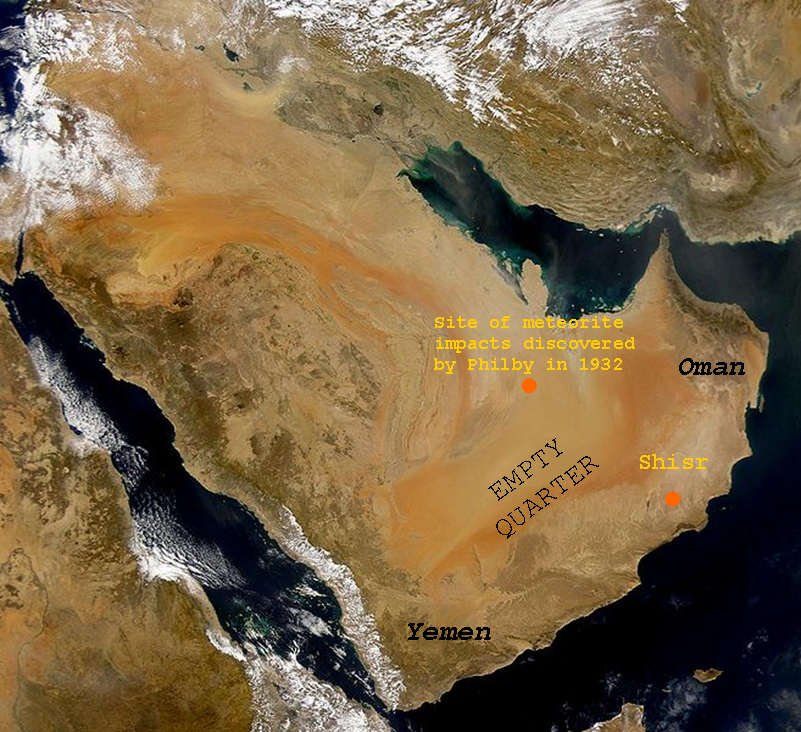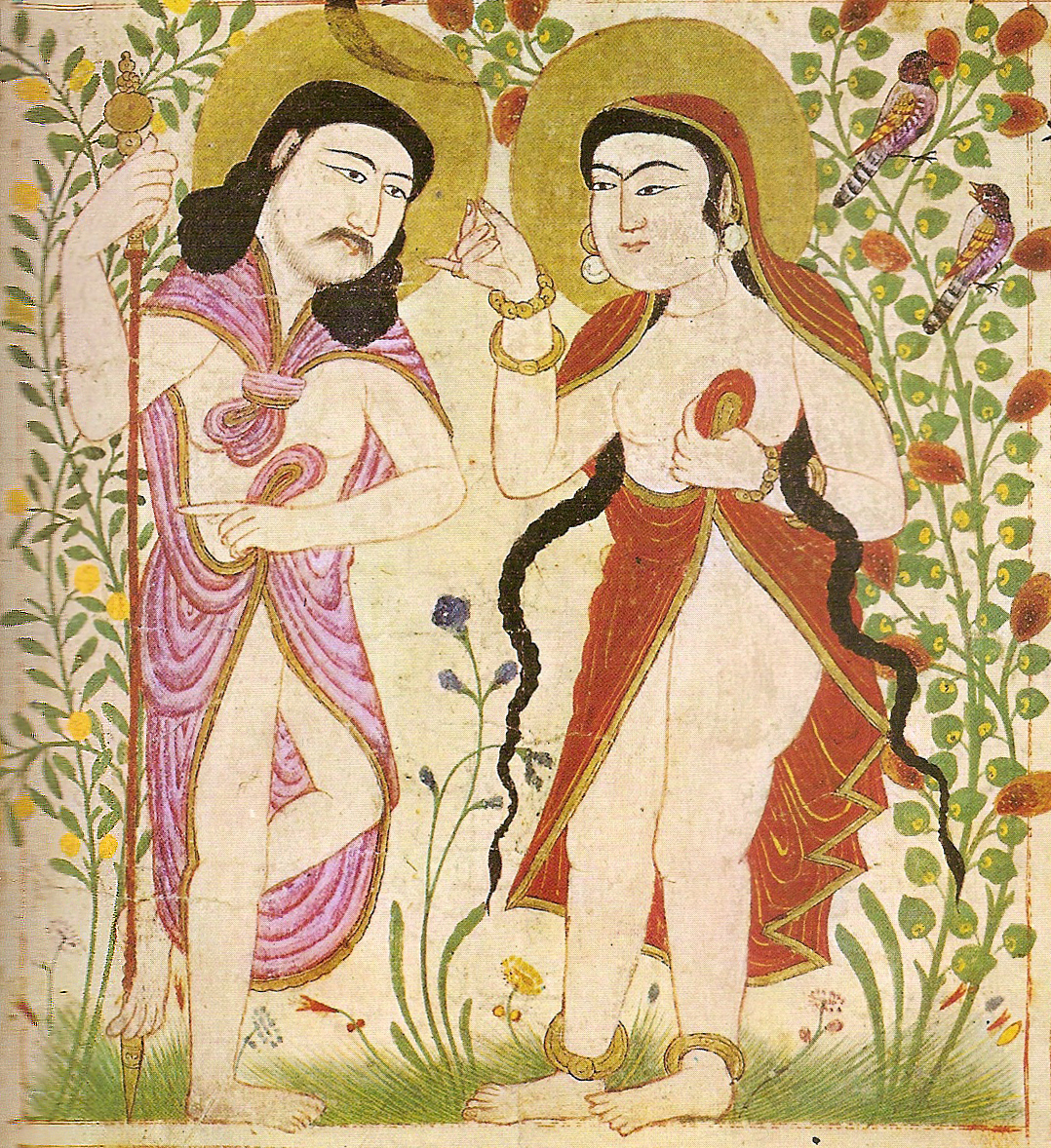|
ʿĀd
ʿĀd ( ar, عَادٌ, ') is an ancient tribe mentioned frequently in the Qurʾān. The tribe's members, referred to as ʿĀdites, formed a prosperous nation until they were destroyed in a violent storm. According to Islamic tradition, the storm came after they had rejected the teachings of a Monotheistic prophet named '' Hud''. ʿĀd is regarded as one of the original Arab tribes, the "lost Arabs". Historicity, etymology, and location In the second edition of the ''Encyclopaedia of Islam'', F. Buhl commented that "whether there really existed, and where, a nation called ''ʿĀd'', is still an unanswered question",F. Buhl, "ʿĀd", in ''Encyclopaedia of Islam'', ed. by Paul Bearman and others, 2nd edn, 12 vols (Leiden: Brill, 1960–2005), , . though in the third edition, Andrew Rippin simply labelled them, less sceptically, "an ancient Arab tribe".Andrew Rippin, "ʿĀd", in ''Encyclopaedia of Islam'', ed by Kate Fleet and others, 3rd edn (Leiden: Brill, 2007–), , . In re ... [...More Info...] [...Related Items...] OR: [Wikipedia] [Google] [Baidu] |
Hud (prophet)
Hud (; ar, هُوْد, Hūd) was a prophet of ancient Arabia mentioned in the Quran. The eleventh chapter of the Quran, '' Hud'', is named after him, though the narrative of Hud comprises only a small portion of the chapter. Historical context Hud has sometimes been identified with Eber, an ancestor of the Ishmaelites and the Israelites who is mentioned in the Old Testament. He is said to have been a subject of a ''mulk'' ( ar, مُلك, kingdom) named after its founder, 'Ad, a fourth-generation descendant of Noah (his father being Uz, the son of Aram, who was the son of Shem, who in turn was a son of Noah): The other tribes claimed to be present at this time in Arabia, were the Thamud, Jurhum, Tasam, Jadis, Amim, Midian, Amalek Imlaq, Jasim, Qahtan, Banu Yaqtan and others. The Quran gives the location of ʿĀd as being ''Al-Aḥqāf'' ( ar, ٱلْأَحقَاف, "The Sandy Plains", or "The Wind-curved Sand-hills"). It is believed to have been in South A ... [...More Info...] [...Related Items...] OR: [Wikipedia] [Google] [Baidu] |
Iram Of The Pillars
Iram of the Pillars ( ar, إرَم ذَات ٱلْعِمَاد, ; an alternative translation is ''Iram of the tentpoles''), also called "Irum", "Irem", "Erum", "Ubar", or the "City of the pillars", is considered a lost city, region or tribe mentioned in the Quran. Iram in the Quran The Quran mentions Iram in connection with ''‘imad'' (pillars): Surah al-Fajr (6-14) There are several explanations for the reference to "Iram – who had lofty pillars". Some see this as a geographic location, either a city or an area, others as the name of a tribe. Those identifying it as a city have made various suggestions as to where or what city it was, ranging from Alexandria or Damascus to a city which actually moved or a city called Ubar. As an area, it has been identified with the biblical region known as Aram. It has also been identified as a tribe, possibly the tribe of ʿĀd, with the pillars referring to tent pillars. The Nabataeans were one of the many nomadic Bedouin tribes who ... [...More Info...] [...Related Items...] OR: [Wikipedia] [Google] [Baidu] |
ʽAd
According to Islamic tradition, Ad (also rendered ''Aad''), who came from the northeast and was the progenitor of the Adites and was the son of Uz (عوض), who was the son of Aram (إرم), who was the son of Shem, the son of Noah (سام بن نوح). Therefore, Noah (نوح) is said to be Ad's great-great-grandfather. In Islamic tradition, the Adites are believed to be among the first inhabitants of Arabia. They belong to what is known as the Extinct Arabs (العرب البائدة). After Ad's death, his sons Shadid and Shedad reigned in succession over the Adites. ʿĀd then became a collective term for all those descended from Ad. According to the Quran, Iram (إرم) is the place to which Hud (AS) was sent in order to guide its people back to the righteous path of God. The citizens continued in their polytheistic ways and Allah destroyed their city in a great storm. Quran 89:6-14 mentions ʿĀd:It is said that Hud along with his closest family escaped the region a ... [...More Info...] [...Related Items...] OR: [Wikipedia] [Google] [Baidu] |
Quran 46
Al-Ahqaf ( ar, الأحقاف, ; "the sand dunes" or "the winding sand tracts") is the 46th chapter (''surah'') of the Qur'an with 35 verses ('' ayat''). This is the seventh and last chapter starting with the Muqattaʿat letters '' Hāʼ Mīm''. Regarding the timing and contextual background of the believed revelation (''asbāb al-nuzūl''), it is one of the late Meccan chapters, except for verse 10 and possibly a few others which Muslims believe were revealed in Medina. The chapter covers various topics: It warns against those who reject the Quran, and reassures those who believe; it instructs Muslims to be virtuous towards their parents; it tells of the Prophet Hud and the punishment that befell his people, and it advises Muhammad to be patient in delivering his message of Islam. A passage in verse 15, which talks about a child's gestation and weaning, became the basis by which some Islamic jurists determined that the minimum threshold of fetal viability in Islamic law ... [...More Info...] [...Related Items...] OR: [Wikipedia] [Google] [Baidu] |
Al-Ahqaf
Al-Ahqaf ( ar, الأحقاف, ; "the sand dunes" or "the winding sand tracts") is the 46th chapter (''surah'') of the Qur'an with 35 verses ('' ayat''). This is the seventh and last chapter starting with the Muqattaʿat letters '' Hāʼ Mīm''. Regarding the timing and contextual background of the believed revelation (''asbāb al-nuzūl''), it is one of the late Meccan chapters, except for verse 10 and possibly a few others which Muslims believe were revealed in Medina. The chapter covers various topics: It warns against those who reject the Quran, and reassures those who believe; it instructs Muslims to be virtuous towards their parents; it tells of the Prophet Hud and the punishment that befell his people, and it advises Muhammad to be patient in delivering his message of Islam. A passage in verse 15, which talks about a child's gestation and weaning, became the basis by which some Islamic jurists determined that the minimum threshold of fetal viability in Islamic la ... [...More Info...] [...Related Items...] OR: [Wikipedia] [Google] [Baidu] |
Quran 11
Hud ( ar, هود, ), is the 11th chapter (''Surah'') of the Quran and has 123 verses ('' ayat''). It relates in part to the prophet Hud. Regarding the timing and contextual background of the revelation (''asbāb al-nuzūl''), it is an earlier "Meccan surah", which means it is believed to have been revealed in Mecca, instead of later in Medina. Verses 105-112 are preserved in the Ṣan‘ā’1 lower text. Summary *1-2 The Quran a revelation from God *3-5 Muhammad a warner and a preacher of goodness *6 Infidels cannot hide their sin from God *7-8 God the Creator and Preserver of all creatures *8 The resurrection rejected by the infidels as sorcery *9 They scoff at threatened punishment *10-11 Mercy and judgment alike disregarded by infidels *12 Those who persevere in good works shall be rewarded *13 The unbelievers demand a sign from heaven *14 Muhammad charged with forging the Qurán *14-15 He challenges the infidels to produce ten chapters like it, or to become ... [...More Info...] [...Related Items...] OR: [Wikipedia] [Google] [Baidu] |
Atlantis Of The Sands
Atlantis of the Sands refers to a legendary lost city in the southern deserts of the Arabian Peninsula, thought to have been destroyed by a natural disaster or as a punishment by God. The search for it was popularised by the 1992 book ''Atlantis of the Sands – The Search for the Lost City of Ubar'' by Ranulph Fiennes. Apart from the English name, coined by T. E. Lawrence, the city is commonly also called Ubar, Wabar or Iram. Introduction In modern times, the mystery of the lost city of Atlantis has generated a number of books, films, articles, web pages, and two Disney features. On a smaller scale, Arabia has its own legend of a lost city, the so-called "Atlantis of the Sands", which has been the source of debate among historians, archaeologists and explorers, and a degree of controversy that continues to this day. In February 1992, ''The New York Times'' announced a major archaeological discovery in the following terms: "Guided by ancient maps and sharp-eyed surveys from sp ... [...More Info...] [...Related Items...] OR: [Wikipedia] [Google] [Baidu] |
Quran 29
The Spider ( ar, العنكبوت, ) is the 29th chapter (''surah'') of the Quran with 69 verses ('' āyāt''). Regarding the timing and contextual background of the believed revelation (''asbāb al-nuzūl''), it is an earlier "Meccan surah", which indicates a revelation in Mecca as opposed to Medina. Early Muslims were persecuted in Mecca where Muhammed was not a leader, and not persecuted in Medina, where he was a protected leader. The surah states that Nuh, Ibrahim, Lut, Shuaib, Hud, Saleh, Musa and Muhammad all were prophets of God. All of them endured hardships. For example, Noah was ridiculed often and Abraham was thrown into the fire. But God destroyed their people who transgressed. As it says in verse 40, So each We punished for his sin; of them was he on whom We sent down a violent storm, and of them was he whom the rumbling overtook, and of them was he whom We made to be swallowed up by the earth, and of them was he whom We drowned; and it did not beseem Al ... [...More Info...] [...Related Items...] OR: [Wikipedia] [Google] [Baidu] |
Encyclopaedia Of The Qur'an
An encyclopedia (American English) or encyclopædia (British English) is a reference work or compendium providing summaries of knowledge either general or special to a particular field or discipline. Encyclopedias are divided into articles or entries that are arranged alphabetically by article name or by thematic categories, or else are hyperlinked and searchable. Encyclopedia entries are longer and more detailed than those in most dictionaries. Generally speaking, encyclopedia articles focus on ''factual information'' concerning the subject named in the article's title; this is unlike dictionary entries, which focus on linguistic information about words, such as their etymology, meaning, pronunciation, use, and grammatical forms.Béjoint, Henri (2000)''Modern Lexicography'', pp. 30–31. Oxford University Press. Encyclopedias have existed for around 2,000 years and have evolved considerably during that time as regards language (written in a major international or a vern ... [...More Info...] [...Related Items...] OR: [Wikipedia] [Google] [Baidu] |
Quran 9
At-Tawbah ( ar, ٱلتوبة, ; The Repentance), also known as Bara'ah ( ar, براءة, ; Repudiation), is the ninth chapter (''sūrah'') of the Quran. It contains 129 verses ('' āyāt'') and is one of the last Medinan surahs. This Surah is reported to have been revealed at the time of the Battle of Tabuk in Madinah in the 9th year of the Hijrah. The Sanaa manuscript preserves some verses, on parchment radiocarbon dated to between 578/44 bh and 669/49ah. It is the only Surah of the Quran that does not begin with ''Bismillah'', the usual opening formula, ''In the name of Allah, the All-Merciful, the All-Compassionate''. It deals with almost the same topics as those dealt with in Surat al-Anfal. In contrast to all other surahs, Muhammad did not order that this formula should be put at the beginning of this surah. Summary *1-2 Four months’ immunity proclaimed to idolaters *3-5 After four months, all idolaters to be slain, with exception of those with whom treaties have ... [...More Info...] [...Related Items...] OR: [Wikipedia] [Google] [Baidu] |
Quran 7
Al-Araf ( ar, ٱلأعراف, ; The Heights) is the 7th chapter (''sūrah'') of the Qur'an, with 206 verses ( āyāt). Regarding the timing and contextual background of the revelation (''Asbāb al-nuzūl''), it is a "Meccan surah", which means it is believed to have been revealed in Mecca. This chapter takes its name from verses 46–47, in which the word ''A'araf'' appears. According to Abul A'la Maududi, the time of its disclosure is about the same as that of Al-An'am, i. e., the last year of the Islamic prophet Muhammad's residence at Makkah: the manner of its admonition clearly indicates that it belongs to the same period and both have the same historical background; however, it cannot be declared with assurance which of these two was uncovered before the other. The audience should keep in mind the introduction to Al-An'am.Abul A'la Maududi - Tafhim-ul-Quran Summary *1-2 Muhammad not to doubt the Quran 3 The people exhorted to believe in it 4-5 Many cities destroyed fo ... [...More Info...] [...Related Items...] OR: [Wikipedia] [Google] [Baidu] |
Ibn Hisham
Abū Muḥammad ʿAbd al-Malik ibn Hishām ibn Ayyūb al-Ḥimyarī al-Muʿāfirī al-Baṣrī ( ar, أبو محمد عبدالملك بن هشام ابن أيوب الحميري المعافري البصري; died 7 May 833), or Ibn Hisham, edited the biography of Islamic prophet Muhammad written by Ibn Ishaq. The '' nisba'' Al-Baṣrī means "of Basra", in modern Iraq. Life Ibn Hisham has been said to have grown up in Basra and moved afterwards to Egypt.Mustafa al-Suqa, Ibrahim al-Abyari and Abdul-Hafidh Shalabi, ''Tahqiq Sirah an-Nabawiyyah li Ibn Hisham'', ed.: Dar Ihya al-Turath, pp. 23-4. His family was native to Basra but he himself was born in Old Cairo. He gained a name as a grammarian and student of language and history in Egypt. His family was of Himyarite origin and belongs to Banu Ma‘afir tribe of Yemen. Biography of Muḥammad ''As-Sīrah an-Nabawiyyah'' (), 'The Life of the Prophet'; is an edited recension of Ibn Isḥāq's classic ''Sīratu Rasūli l-L� ... [...More Info...] [...Related Items...] OR: [Wikipedia] [Google] [Baidu] |







